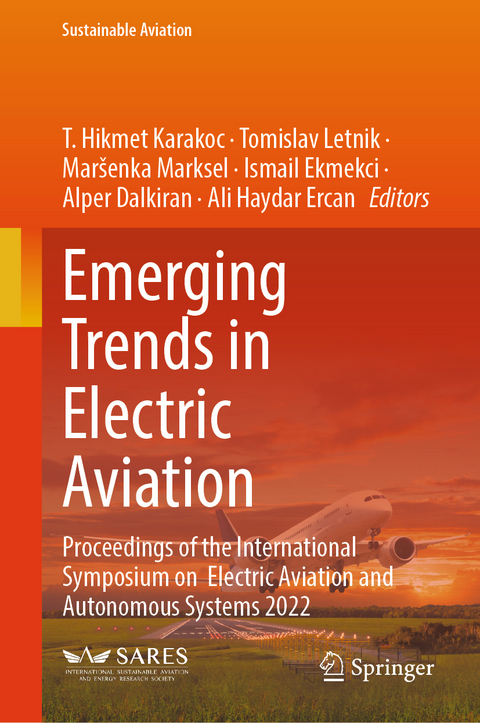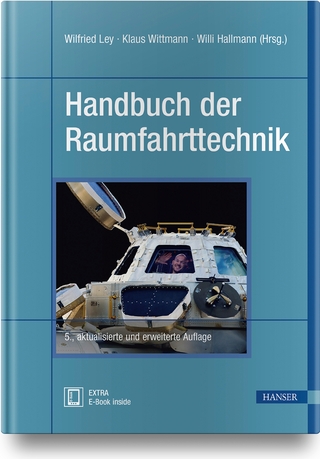
Emerging Trends in Electric Aviation
Springer International Publishing (Verlag)
978-3-031-37298-8 (ISBN)
lt;p>T. Hikmet Karakoc, Ph.D., graduated from Anadolu University, the Department of Mechanical Engineering. He received his M.Sc. degree in Mechanical Engineering from the Yildiz Technical University. He received his Ph.D. from Anadolu University, where he started his full-time teaching and received his Full Professorship. He is currently researching at the Eskisehir Technical University. He has a wide range of research interests, including Sustainable Aviation, Aircraft Propulsion Systems, Insulation, Heating, Ventilating, and Air Conditioning, Indoor Air Quality, Gas Turbines, Cogeneration Systems, Renewable Energy, Energy Economics, Fuels, and Combustion. He has participated in numerous industrial projects on these topics as a researcher, consultant, and project manager for over 30 projects and corporations. He also started a contest on special insulation applications among university students. He served as an Editor-in-Chief, guest editor, and editorial board member for international scientific journals. He published national and international papers in over 300 journals and 40 books. Professor Karakoc actively follows membership positions for the Chamber of Mechanical Engineers and many sectorial associations, international scientific organizations, and societies. He is an active Board of Directors member of the International Association for Green Energy. He is currently holding the presidency of the SARES organization, which is actively supporting scientists and students in the area of Sustainable Aviation. He also organizes four symposiums on aviation subject areas as a Founding Chair.
Tomislav Letnik, Ph.D., is Head of the Transport Economics Centre at the University of Maribor, where he has been a project manager since 2005. His work involves the management of several European and national projects in the field of logistics and transport economics. Dr. Letnik is also a lecturer at the University of Maribor for courses on logistics, transport economics, investment decisions, and system theory. He holds a B.S. degree in transport engineering and has successfully concluded postgraduate studies at the University of Maribor.
Marsenka Marksel is a research assistant with the Faculty of Civil Engineering, Transportation Engineering, and Architecture at the University of Maribor. She received a Bachelor's degree from the University of Maribor Faculty of Economics and Business. During her studies, she was actively involved in several research projects at the Institute of Economic Analysis and Forecasting and the Transport Economic Centre at the University of Maribor.
Ismail Ekmeki, Ph.D., is a lecturer in the Department of Industrial Engineering at Istanbul Commerce University. He received his MSc in Mechanical Engineering from the School of Science at Yildiz Technical University, an MSc in Industrial Engineering from Istanbul Technical University, and a Ph.D. in Mechanical Engineering from Yildiz Technical University in 1982, 1983, and 1995 respectively. He has worked as a researcher, executive, and manager in academic positions on various industrial projects. His areas of research cover energy, optimization, decision making, safety, OHS, and HVAC-related topics.
Alper Dalkiran, Ph.D., received his bachelor's degree from the Avionics Department, Faculty of Aeronautics and Astronautics at Eskisehir Technical University (formerly known as Anadolu University). He completed his MSc degree in the School of Science from Anadolu University in 2004 in Aviation Maintenance. He earned his Ph.D. degree in 2017 in Environmental Sustainability on Airports from the School of Science at Anadolu University by developing a model of energy-based calculations of an aerodrome. He has studied on aircraft engines, sustainability, airports, and exergy. He has 17 years of professional experience in Airports in Inf
Chapter 1. Gas Turbine and Fuel Cell Hybrid Systems.- Chapter 2. Implementation of a 2-Seat Hybrid Electric Aircraft Demonstrator for Reducing Carbon Emissions.- Chapter 3. Thermal Analysis of ASTINSAT-1.- Chapter 4. Numerical Examination of Different Flow Channel Fractions Effects in A Vanadium Redox Flow Battery with Serpentine Flow Field.- Chapter 5. Flutter Analysis of a 3-D Box Wing with Distributed Electric Propulsion.- Chapter 6. Force Attenuation Properties of Multilayer Polyurethane and 3D Fabric Composites.- Chapter 7. Transport Operators Total Load Comparison by Analytical Hierarchy Process (AHP).- Chapter 8. Analysis of Safety Risks Related to Alternative Aviation Fuels.- Chapter 9. Additive Manufacturing Opportunities in the Aviation Industry.- Chapter 10. Comparison of the Speed Change and Vector Maneuver Techniques for the Conflict Resolution Problem: Fuel and Flight Time Analysis.- Chapter 11. Assessing Battery Characteristics During a Full Discharge in an Electric Aircraft.- Chapter 12. The Autonomous Air-Sea-Interface-Vehicle: Is it the Key to Abundant Green Energy?.- Chapter 13. Development of Viscous CFD Analysis Model Including Real Gas Effects for Nose Optimization at Hypersonic Speeds.- Chapter 14. Real World Path Generation for Non-Holonomic Systems with Obstacle Avoidance Using RRT* and Google Earth.- Chapter 15. Structural Synthesis of Euclidean Parallel Robot Manipulators of Spacecraft Docking System.- Chapter 16. Future prospects for fuel-cell aircraft - challenges and opportunities.
| Erscheinungsdatum | 25.08.2023 |
|---|---|
| Reihe/Serie | Sustainable Aviation |
| Zusatzinfo | XI, 122 p. 64 illus., 52 illus. in color. |
| Verlagsort | Cham |
| Sprache | englisch |
| Maße | 155 x 235 mm |
| Gewicht | 331 g |
| Themenwelt | Technik ► Luft- / Raumfahrttechnik |
| Schlagworte | aircraft design • Aircraft HVAC • Autonomous Systems • electric aircraft • Electric Propulsion • Energy Storage • Fuel Cells in Aircraft • Hybrid-Electric Propulsion Systems • renewable energy • smart sensors • Sustainable aviation • unmanned aerial vehicle (UAV) |
| ISBN-10 | 3-031-37298-0 / 3031372980 |
| ISBN-13 | 978-3-031-37298-8 / 9783031372988 |
| Zustand | Neuware |
| Haben Sie eine Frage zum Produkt? |
aus dem Bereich


